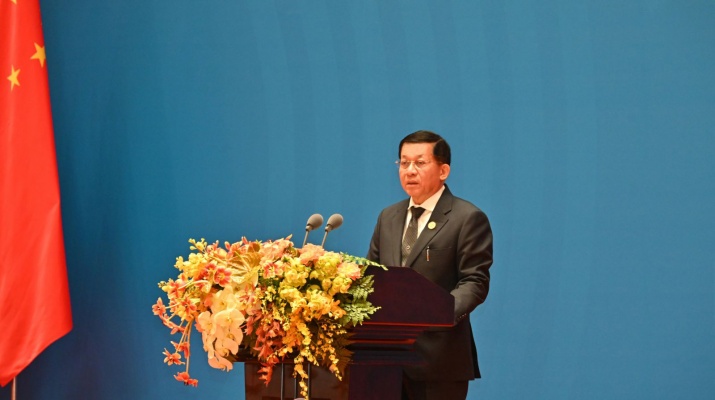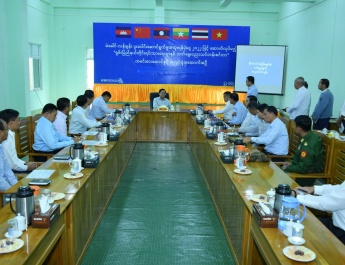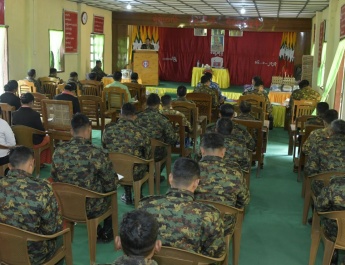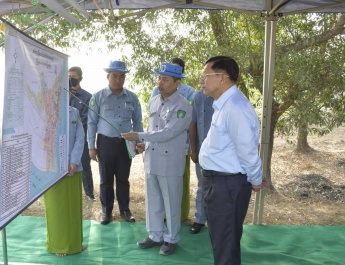NAY PYI TAW November 7
The 8th Greater Mekong Subregion Economic Cooperation Program (GMS) Summit was held at Haigeng Convention Center in Kunming, the People’s Republic of China, this morning, participated by Chairman of the State Administration Council Prime Minister Senior General Min Aung Hlaing.
The Summit was also attended by Prime Minister of PRC H.E. Mr. Li Qiang, Prime Minister H.E. Mr. Hun Manet of Kingdom of Cambodia, Prime Minister H.E. Mr. Sonexay Siphandone of Lao People’s Democratic Republic, Prime Minister of Thailand H.E. Ms. Paetongtarn Shinawatra, Prime Minister of Vietnam H.E. Mr.Pham Minh Chich, President of Asian Development Bank Mr. Masatsugu Asakawa, and ministers, deputy ministers and senior officers and officials of GMS countries.
The Summit was held in two parts – Leaders’ Retreat and Plenary Session.
On arrival at the venue, the Senior General was welcomed by the Chinese Prime Minister.
The Senior General then posed for documentary photos together with PMs of other countries.
At the Leaders’ Retreat, the meeting chair, the Prime Minister of PRC, delivered the keynote address.
Leaders of the GMS countries discussed integrated work programs and preparations under the topic “Innovation driven Development”.
In his discussions, Chairman of the State Administration Council Prime Minister Senior General Min Aung Hlaing said his discussion at the retreat would be centred on the emergence of a successful subregion through innovation.
It is common knowledge that at this age, technology and research and innovation must be helpful for economic and social progress of a country. Countries and regions that support innovation are able to promote social qualities including the promotion of economy, generation of jobs, enhancing of competitiveness amidst the rapidly changing global economy.
As regards the collective participation of the regional entrepreneurs, the Senior General said, “At the same time, innovation must be adaptable to the country’s geographical conditions.
In addition, it calls for the collective involvement of intellectuals and intelligentsia, entrepreneurs and business community, apart from the government, development partners, private sector and local governments.”
Another part is the vital importance of resources.
R&D is the essential resource of innovation.
But a perfect achievement will come only through the integrative support of other resources — the government, the private sector, local and foreign investors, development partners.
A country needs suitable action programs such as the task force as the administrative machinery and forums in realizing innovation projects.
Myanmar has set up the National Science, Technology and Innovation Council and is engaging in innovative undertakings.
The Subregion formed with ago-based countries must accelerate its ago-economic development and food sufficiency with innovative forces.
The task of linking all the sectors of the GMS program with innovation strategy is important.
Especially, the program of prioritizing the agricultural, tourism, trade and investments sectors under the strategy meets the regional requirements.
Aside from those prioritized sectors, preparations must be made for the remaining ones such as energy, rural development and transport sectors.
Especially in the health sector, the integration of therapeutic technologies and introduction of advanced therapies must be carried out through technology transfer centers and knowledge sharing centers, with the involvement of advanced tech-used public health services, health and human resources linkages, and medical university-level connections.
As copyrights laws and sector wise laws of the relevant countries have been enacted, it is believed that all GMS countries can realize progress by promoting connections and cooperation in the innovation sector on a country-by-country basis or via foreign investments.
The Meeting Chair presented a brief report on the discussions and delivered the concluding address.
The first part ended.
The second part, plenary session of the leaders, was held under the topic “Towards a Better Community through Innovation driven Development.”
It was participated by leaders of six member countries, the ADB president, ministers, deputy ministers and senior officers of GMS countries, representatives of development partner associations, representatives of private sector, and representatives of regional governments of the member countries, totalling about 200.
Prime Minister H.E. Mr. Li Qiang of the host country, PRC, delivered an address, followed by the speeches of leaders of the member countries and ADB president.
In his address, Chairman of the State Administration Council Prime Minister Senior General Min Aung Hlaing said during September this year, a large population of the member countries including Myanmar faced floods and landslides due to Typhoon Yagi. Myanmar has carried out rehabilitation undertakings by government to- government assistance, and joining hands with ASEAN and international communities and the people.
He prayed for all the Yagi victims of the GMS countries to reach the normal condition soonest.
The Senior General took pride in the GMS program that has gain significant successes during over three decades of march since 1992.
As regards the approval of the concept paper on strategy, he said, “As the international community is paying attention to innovation, the topic “Towards a Better Community through Innovation driven Development” and Innovation Strategy that would be approved today are appropriate for the Subregion. Technology and innovation are the main driving force of enhancing production capacity, technological development and creating new industries and job opportunities.”
It is common knowledge that the Innovation Strategy 2030 is prepared with the aim of accelerating the force of cooperation in implementing the GMS Strategy Framework 2030.
The Concept Paper was approved at the 26th GMS Ministerial Meeting held in Myanmar in December 2023.
Today, the world faces interconnected challenges, including climate change, food security, natural disasters, inflation, global health crises, rising energy prices, migrant worker issues, and economic inequality.
Addressing these challenges requires coordination and a multi-faceted approach, as they cannot be resolved by any one country or organization alone.
By pooling resources, sharing knowledge, and adjusting policies as needed, we can enhance the resilience and long-term sustainability of the Greater Mekong Subregion (GMS).
As GMS countries share similar geographical conditions, interconnected waterways, ecosystems, and climates: addressing these challenges requires collaboration under the 3 Cs of the GMS program: Connectivity, Competitiveness, and Community.
A country’s public healthcare is crucial, as healthy and strong human resources are essential for building a modern, developed nation. With the growing population, changing socio-economic factors, and evolving environmental conditions, the country’s healthcare system must be strengthened by making the best use of existing resources to ensure quality.
Also, he emphasized that national-level activities should be aligned with the GMS health strategy and coordinated with local governments.
He also mentioned that he would like to briefly address food security, which is a challenge in the region.
He stated that the world’s population is currently 8.3 billion, and it is estimated to reach 8.6 billion by 2030 and 8.9 billion by 2035.
The issue of food security is expected to grow more significant.
As food production, trade, and distribution extend beyond national borders, making regional cooperation is crucial when addressing food security.
He also emphasized the importance of sharing knowledge on agricultural innovations, developing local food markets, and increasing investment, including technology exchange.
In Myanmar, modern agricultural and livestock methods are being utilized to ensure the food security of the population.
In 2023, Myanmar was ranked 8th among the world’s largest rice exporters and 2nd in bean exports. Therefore, we would like to announce that efforts are ongoing to ensure domestic food security while also increasing exports.
Furthermore, he highlighted that the emphasis on the importance of business corridors is one of the key symbols of the Greater Mekong Subregion (GMS). The development of economic corridors plays a crucial role in accelerating a country’s economic growth, promoting regional integration, and fostering inclusive development.
Increasing linkages between producers and markets can enhance trade along economic corridors, while also opening new markets in transnational trade. By utilizing these economic corridors, all member countries must focus on achieving inclusive regional economic development.
He also provided a brief update on the current initiatives in Myanmar. Myanmar follows a foreign policy that is free, active, and neutral, grounded in the five principles of peaceful coexistence.
The country maintains a policy of friendship with all nations.
On our part, we prioritize the interests of the country and its ethnic people by advancing five-point roadmap, with nine political, economic, and social objectives being implemented in respective sectors.
Despite the rapidly changing situation, Myanmar will continue to cooperate in implementing existing international and multilateral agreements, as well as other international commitments.
Equality and inclusiveness are fundamental principles of global cooperation. Therefore, in implementing sector-specific projects that will support socioeconomic development in the GMS region, cooperation among member countries is essential.
This includes not only the support of the GMS Secretariat but also the involvement of development partners, the private sector, local governments, and all other responsible stakeholders.
He expressed his confidence that the recommendations from the country’s leaders at this summit will significantly contribute to the development of a stronger, more resilient, and sustainable GMS community in the future.
Then, the Minister of Finance of the People’s Republic of China reported to the leaders on the progress made since the seventh GMS summit.
Following that, a report on the Greater Mekong Economic Corridor State/Regional Level Leaders Forum 2024 was presented by a Yunnan government official.
The results of the meeting with development partners were also presented by an official from the GMS Secretariat. The meeting concluded successfully with the approval of the Summit Joint Declaration and the GMS Innovation Strategy 2030.
Presented at the summit with the Senior General were the SAC Joint Secretary, SAC members, Union ministers, region chief ministers, deputy ministers, and officials from military and civilian sectors.
The Greater Mekong Subregion (GMS) Economic Cooperation Program, launched in 1992, is a regional initiative that has successfully endured for over three decades. Under the GMS program, summits have been held every three years since 2002, marking the 10th anniversary of the GMS.
The six countries of the region take turns hosting the summits in alphabetical order.
Myanmar hosted the fourth Greater Mekong Subregion Summit in 2011, which took place in Nay Pyi Taw on December 19th and 20th.
At the summits, commitments are made to meet expectations for the subregion’s future development, with key joint statements issued by the leaders of the participating countries.
It was reported that the 8th GMS Summit, held today, approved innovative policies and the summit’s joint declaration.





